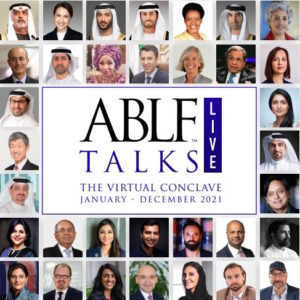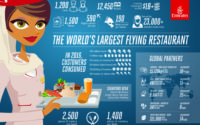Economic Recovery From The Pandemic Will Take Two Years Note Experts At ABLF Talks Virtual Conclave
The Fifth Virtual Conclave of the ABLF Talks saw participation by Chairwoman of UAE Space Agency H.E. Sarah bint Yousef Al Amiri, hospitality magnate William Heinecke and Dubai Duty Free CEO Colm McLoughlin among others
Resilient and inclusive leadership, out-of-the-box approach to investments, promotion of scientific temper and ensuring the protection of the weakest segments of society are the key to seeking a recovery from the impact of the COVID-19 pandemic, said speakers at the Fifth Virtual Conclave of the Asian Business Leadership Forum (ABLF) held on May 18, 2021, at the cutting-edge Virtual Venue, the ABLF City.
As always, the monthly conclave, held in partnership with the UAE Ministry of Economy, brought together stalwart speakers from around the world to discuss the social and economic disruption brought about by the pandemic and ways to mitigate them through sustainable solutions.
UAE’s first Minister of State for Advanced Technology and Chairwoman of the UAE Space Agency, Her Excellency Sarah bint Yousef Al Amiri, shared her insights on the successful launch of the Hope Probe amidst the pandemic that propelled UAE’s Space Programme into a whole new league. She noted that risk mitigation and providing necessary flexibility were the keys to circumvent the challenges of launching the mission during the height of the pandemic. “All nations have a social and economic obligation to ensure that they establish a robust science ecosystem,” she said.
William Heinecke, the Founder and Chairman of Minor International (MINT), one of the largest hospitality, restaurant and lifestyle companies in the Asia Pacific Region, admitted his enterprises incurred losses of approximately $700 million in the last fiscal year, due to the pandemic but were also among the first to get back to the market, raising over $500 million in capital. He suggested ways and measures for the hospitality industry to bounce back from the impact of COVID-19. Heinecke also highlighted the need for a more rigorous vaccination drive across Asia for the travel industry to witness a comeback to pre-pandemic levels. “It is going to be an uneven ride out of the pandemic. 2021 is still going to be very challenging,” he added.
Echoing the sentiment was Colm McLoughlin, Executive Vice Chairman and CEO of Dubai Duty Free, the single largest retail operator in the world. He spoke about the need for companies to fulfil their obligations to employees in unprecedented situations adding that leaders must be ready to, “Fight a little harder, cooperate a little better, have full discussions on taking action for a rebound to normalcy.”
Like Heinecke, McLoughlin’s estimated that the travel industry will take a while to witness a true recovery. He said, “It will take two or three years before we get back to business and revenues of the pre-pandemic years.”
Despite the setbacks, the Dubai Duty Free had adopted innovative strategies to circumvent the uncertainties such as the launch of an online home delivery service, which reported a total of $14 million since last June.
The impact of the economic setbacks on the weakest sections of society was the focus of the session by Dr Guy Standing, Professorial Research Associate, SOAS University of London, UK and Co-Founder and Honorary Co-President, Basic Income Earth Network (BIEN). A strong proponent of universal basic income and why it could serve as a tool to tackle the pandemic and address inequalities in the longer term, Dr Standing said, “The rationale for a basic income for every citizen and resident is ethical which increases freedom of societies. In a sense, basic income is a social dividend.”
He added, “The resilience of all of us depends on the resilience of all of us, including the weakest members of society. If they are left vulnerable and weak, they won’t be able to behave the way we’d expect them to behave.”
Co-Founder and CMO, Sarwa, the first hybrid automated investment platform in the region, Nadine Mezher, talked about how the pandemic has drastically changed the business environment and consumer behaviour to which enterprises must adapt and pivot. She told delegates, “Business ownership has been the backbone of the economy in the region. Now, we’re seeing more and more youth looking to change the status quo, getting involved in entrepreneurship, as well as a lot of involvement from the government. There’s a great top-down approach, in place in the region to rebuild a vibrant economy.”
Commenting on current trends in the start-up sector, she believed that “while eCommerce may take a backseat, there’s going to be a stronger focus on fintech, agritech and healthtech—in short, a greater emphasis on technology that can add value to the economy”.
The COVID-19 pandemic has also greatly accelerated the MENA’s fintech sector. Founding Partner, VentureSouq, a UAE-based investment platform for global early-stage technology businesses, Sonia Weymuller spoke about impact investment in the region and the global shift in the arena with more millennials and Gen-Z entrepreneurs. She described any fintech opportunity as a “financial inclusion opportunity”.
The event is being held in partnership with the global Indian conglomerate, the Aditya Birla Group who joins the ABLF as a Platinum Partner. This month, the ABLF Talks is also joined by Strategic Partner UNICEF that is carrying out the largest vaccine procurement and supply operation ever under the global COVAX facility. The Virtual Conclave is also supported by a prestigious line-up of partners including Etisalat as the Official Telecom Partner and Associate Partners Aster DM Healthcare and MAA & Partners, as well as Strategic Partners, FICCI (Federation of Indian Chambers of Commerce & Industry) and Singapore Business Council (SBC) UAE.
The next Virtual Conclave of the ABLF Talks is set to be held on June 8.







